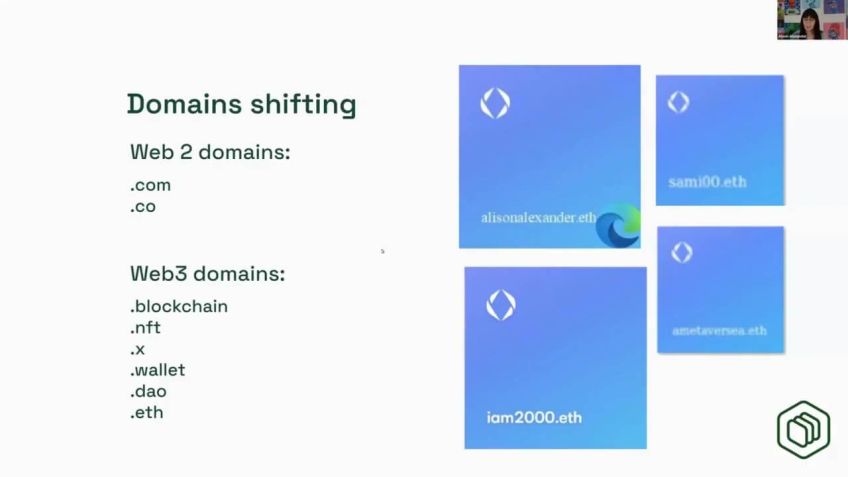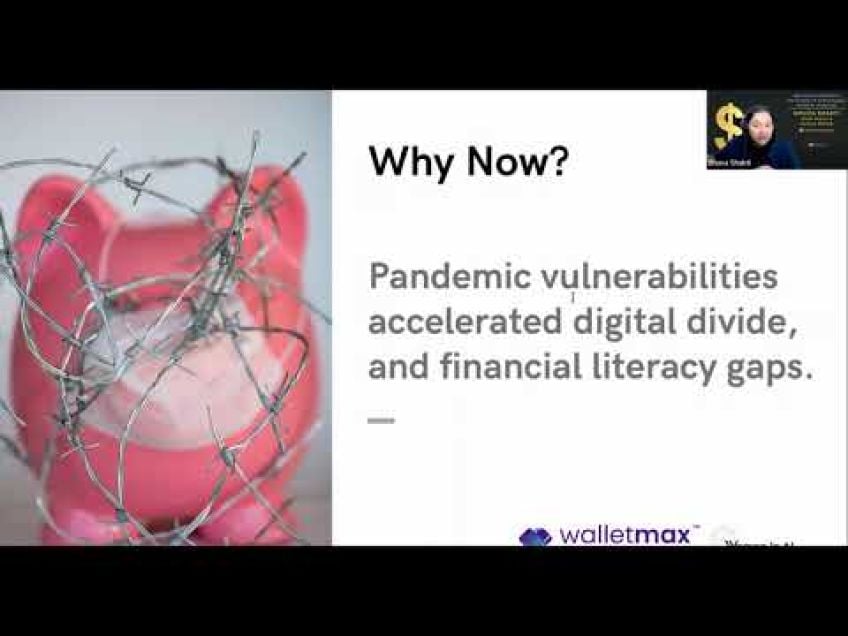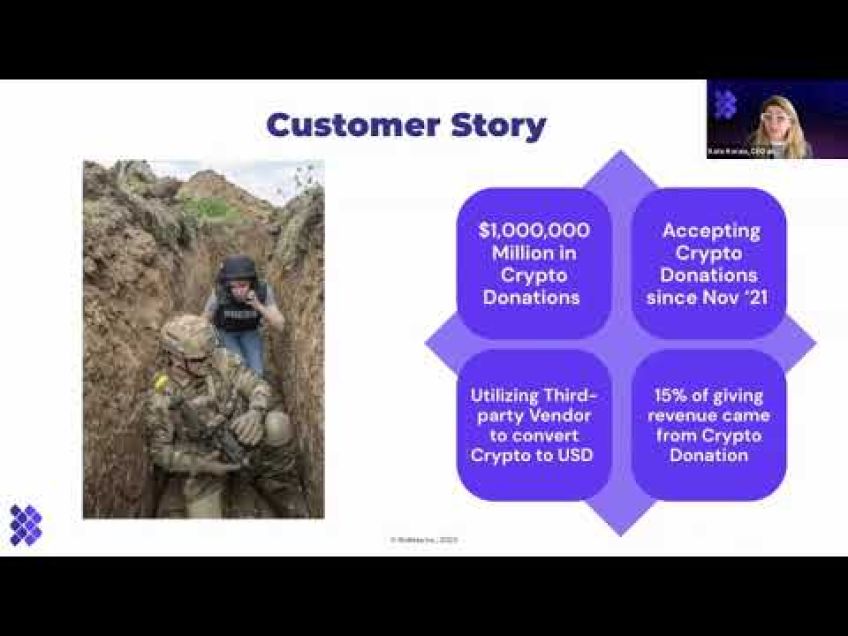Forget everything you thought you knew about “crypto”
Alison McCauley
Chief Advocacy OfficerUnraveling the Mystery of Crypto and Blockchain Technology
Welcome to an engaging exploration of two of the most captivating topics in technology today – generative artificial intelligence and crypto with blockchain technology. With mind-boggling headlines and controversial debates surrounding these tech spheres, it's high time we delve deeper and understand what it's all about.
Perception of Crypto and Blockchain
When you think about crypto, blockchain, and web three, what comes to mind? For many, the realm of cryptocurrencies and blockchain is shrouded in a thick fog of mystery and misunderstanding. Be it negative connotations from Google searches or controversies in the crypto market like the FTXS demise, a lot is lost in the chaotic overflow of information. However, there is much more to this story than meets the eye – crypto is a fundamental core technology that holds the potential to transform our digital worlds.
A Tale of Two Interpretations
As with every technology, blockchain and crypto also have their shares of misuse. These tools have been used detrimentally by some, causing harm and raising skepticism. However, it is essential to realize that blockchain and crypto is also being harnessed to drive substantial change – change that could successfully rebalance the power dynamics in our digital world that are currently skewed. Understanding this dual nature is crucial to expanding our perspectives on this revolutionary technology.
Blockchain: More Than Just a Ledger
Contrary to popular belief, blockchain is not just a ledger. Yes, it is a form of ledger, but with distinct 'superpowers'. Blockchain technology is designed to bypass the need for trust in middlemen, thus opening up potential for incredible innovation. In its essence, blockchain technology can take anything and certify it, track it, and use it in novel ways, making it a "computing platform" as coined by A16Z.
The Multitude of Crypto Assets
When we think of crypto, Bitcoin and Ethereum come to mind as mediums of exchange. Something self-sovereign and decentralized that we own and can manage. However, there are numerous other forms of crypto or tokens that hold value within different contexts:
- Tokens that represent voting power within a network
- Tokens that represent unique digital assets (NFTs)
- Tokens paired with physical goods
- Tokens signalling proof of membership, attendance or experience
- Tokens tied to your unique identity (Non-transferable tokens)
A New Digital Generation
The Generation Z, well-practiced in digital currency usage in the gaming world, could soon turn into a crypto-native generation, shifting traditional perceptions of 'money'. Crypto and blockchain technology's potential to foster new kinds of fluidity and value exchange across industries is particularly intriguing to explore.
Crypto & the Evolution of the Web
The potential of tokens to shift the way value that's created on the web can be distributed to individuals instead of platforms is exciting. In particular, Web 3.0 or Web 3, with tokens and Cryptos, could enable us to regain the value that has thus far primarily gone to top platforms and companies, thus decentralizing the internet wealth. A few areas where I am enthusiastic about the role of Web 3 are empowering creators, decentralized autonomous organizations, and giving individuals more control and choices.
A Journey into Crypto & Blockchain: Where are we now?
Although we're still in the early stages of Crypto and Blockchain technology, the potential is massive. But getting there is going to be a process fraught with challenges, including regulatory uncertainty, UX, scalability and many more. However, human nature tends to overestimate the impact of new technology in the short run and underestimate it in the long run. Considering this, blockchain and crypto may take some time to proliferate fully but will ultimately open the doors to a significant shift in our lives and work.
Now is a fantastic time to delve deeper and explore this space. Implementing blockchain and crypto could considerably improve your business and personal life.
Further Learning Opportunities
If you're interested in exploring more about these topics, I regularly post updates and resources that could help you. Unraveling the mysteries surrounding these fascinating technological shifts could provide you with a far better understanding of your digital world.
Video Transcription
Welcome everyone to a session to talk about one of probably two of the hottest and most interesting topics in technology today. I think the uh mind share is really on generative A I and crypto and Blockchain and with three.And so I'm really happy that we're all getting a chance to connect and talk about this a very important and interesting topic and I am looking forward to hopefully sharing some thinking that's a little different about how you normally would think about crypto or kind of what cut some of the um the the headlines in the press are talking about crypto.
And so I wanna start actually by taking a moment for you to think about what perceptions you're bringing into this virtual space where you are in. When you think about crypto, when you think about Blockchain, when you think about web three, what comes to mind whether it's a question or a perception or belief, what is it that comes up for you? I've been educating on this space for six years and I can um assure you that there's a lot of uncertainty misunderstanding about the space and this extends even if you look at, say what Google searches are bringing up. When we think about crypto, you can see that there's a lot of negative sentiment out there that comes up. Uh It's quite common and it is true that there is a lot of, of um provocative stuff happening in the space. This is a, it can be over the top. This is a picture from an event in NFT event in New York where um it was at the top of the market and there was a lot going on. There are definitely areas where we're seeing scams, we see regulatory challenges, we see markets that are crashing and this one in particular ftxs demise, what Sam did um was pretty deflating overall to the space. And in fact, I found the bad acting in this situation.
So disheartening that I actually took a break from writing about the space, speaking in the space for months and it's only now that I've really started back in and this was after working in the space for for many, many years. There's so much more to the story than what's in these headlines. There's so much more to what crypto is really, this is a fundamental core technology that can change the way that our digital worlds operate. And so it's important to get better feel for that more robust um flip side. So you're hearing a lot of people that are also in the space that are talking about how this can be a fundamental driver of change. How crypto is a platform and maybe one of the most important platform shifts of our time, how eventually tokenization and how Blockchain enables tokenization can change so much. And so who's right? How do you know who's right? Well, I have been working in emerging tech for over 30 years and since 2017, I've been fully immersed in the web three space working with the builders who are working through development of the infrastructure and the technology that will um be the foundational layer for a lot of this change.
And I can assure you that this is a tale of two interpretations of the same technology. So with every technology, because technology is just a tool, there will be bad actors and there will be uh people who use it for their um their own purposes that may not serve us as a society. This is true of every technology um from a pen on a stone, anything that we use. But there are many people who are using this technology to drive real change and change that could actually shift the power dynamics in our digital world to that are today quite uneven. And so that's the story I want to talk about and give you a feel for today. So this all, all of crypto is really based off of a core technology called Blockchain, which I'm sure you've heard a ton about and you might have heard that Blockchain can be thought of as simply a ledger and it is a um Blockchain is a ledger, but it's got some really interesting superpowers and it is meant to enable us to circumvent people who are sitting in the middle that we need to trust.
So for example, in um the picture we're looking at right now, you have to trust the people who are uh maintaining the letter ledger to know that they're gonna do this correctly. Um Blockchain was created completely changed that and I'm gonna share with you the Genesis block, which is the initial block of Blockchain. Um The first Blockchain is a Bitcoin Blockchain created to make Bitcoin possible. And we're actually looking at the very first block of that chain and in it, you see that there is a message and you might have already spotted it. Um It was created um in order to make it possible to decentralize and circumvent centers of power in the financial services industry. And the message that was in the first block actually is the headline from the times on the day that um that the block was created. And so it was created for this purpose and has since been envisioned and applied to every single market space and industry that you could possibly imagine. And this the ability to circumvent um a need to trust a person and to work to be able to trust through code is jet fuel for change essentially, what it enables us to do is to take anything and certify it, certify its provenance or its attributes if we wanted to program conditions of exchange, track it and then use it in new ways.
And this is essentially what it is. And so what we can think about it is far more than what we consider a ledger today. We can think about it about how this is from a 16 Z in a recent report that was really comprehensive around two, about um their 2023 view of the state of crypto and um A 16 Z I think said it beautifully when they talk about how blockchains are more than ledgers, they are computers and how crypto isn't just a new financial system.
It's a new computing platform. And we know that computing can be extended to every single, every single space and every single industry. So Cryptocurrency as we know it, you might hear of Bitcoin or Ethereum. Um And using it as a basic medium of exchange is just one kind of crypto asset. And in fact, there are so many. So if we look at um crypto assets that are different kinds of tokens, there's almost any kind that you can imagine and more are being generated in um new forms and new ways all the time. So I'll just give you an overview of some of the kinds of tokens. So um Bitcoin and Ethereum are also tokens that can be earned by maintaining a network or to use a network or service. So you might have heard of Bitcoin Miners, for example, um tokens could be used to vote or participate in governance of a network or of an organization. And so a token could represent voting power. Uh tokens can re represent unique digital assets. So we hear a lot about NFTS, non fungible tokens in applications for music or for art or there might be digital pairings where you have a digital good, maybe it's sneakers, maybe it's something with more impact and you have a physical good.
So it's paired with a physical good and it can track that kind of ownership. Uh There could be tokens that are a digital twin of an asset. So you can imagine a building that is tokenized or a good that's moving through a supply chain that's tokenized. And what's really interesting about that is when you're basically creating a computer platform for that specific building or maybe that specific good, you can do all kinds of interesting things with it and you can use it in a new way. And so this is really changing the way we think about things like real estate or supply chains or any kind of movement of goods or trade or value exchange of goods. We can also think about fractional shares or fraction uh uh tokenized um portfolio that could be a portfolio of art where a group of people even strangers could safely own an entire portfolio of art and benefit from the upside of that. Or maybe it's a portfolio of real estate or maybe it's someone buying in a share to a fractional piece of real estate. So a building that would be very difficult and costly to uh be able to come up with a legal agreements in order to own a small fraction of it could be tokenized.
And then those fractions could be exchanged um with the more efficient value exchange that you can do through tokens or crypto tokens can be a proof of a membership or attendance or an experience. So proof that I attended something I went to an event or that I'm a member of a private discord channel. There are discord channels that are token gated. So you can only get it. If you have a certain number of tokens in your wallet, there can be tokens that are not transferable. So non-transferable tokens and these can be useful for, for example, setting up a um a proof of an educational credential or, or uh an other attribute of your identity. And so you can imagine especially in a world where we might be increasingly displaced and move around, it is very helpful to be able to have tokens that can be tied to your unique identity and can supersede boundaries and borders um and withstand um displacement. Uh So if we sum it up, you can think about how tokens are really a, a flexible and programmable mechanisms for capturing and transaction all kinds of value. And so we can think of it in terms of the fact that you have these key attributes that we're familiar with, with money where it's durable, it's divisible, it's portable money as we traditionally think of it today also has it attributes.
But with tokens, we also have an ability to have it then be self sovereign where we're owning and managing them. Um They can have decentralized traceability where we don't need to rely on a central party to trace their history, their prominence, um or what has happened with them and we can transact at a more granular level. And so this gives us an opportunity to unlock value in an economy that we may not have been able to uh before or that it may not have made sense to unlock before. Um It wasn't cost effective to unlock before. And of course, this is across industries and there's so many interesting ways that they can be applied. But I think that one area that's really exciting for me is when we think about how this from a generational perspective can be perceived, I had an interesting experiment or experience with my teenage daughter. She asked if, you know, I'd wanna, if would I give her some money to go to the nail salon? And of course, I said, no, pay for it yourself. And when she came back with really fancy nails.
I was a little surprised and I asked her how she paid for it and she said, well, I didn't actually use real money. I used cash and that totally floored me because we used to think of cash is very real money and digital forms. Not so now you have this generation Z with it that is extremely digital native, very be um primed if you will to be crypto native as well. And so what happens in that world where they are able to work um with tokens to create new kinds of fluidity and value exchange in markets um across industries where I'm really excited about this is how this applies to the web. And so when we think about the, how the web has changed over time, tokens can play a big part in shifting the way the wealth that's created on the web or value that's created on the web can be distributed to people instead of platforms. So web one is a version of the web that allows us simply to um to, to read what was out there or to publish it if you had deep technical expertise and could do so with Web two, we had an ability for everyday people to be able to publish and interact with other web people on the web.
So this is how we got social media and we got product reviews and we got so many other different kinds of functionality So this was supposed to be a way for people to become very powerful. In fact, in 2006, the time personal year was, yeah, you were to be the controller of the Information Age and this isn't what happened. Instead, the value went to top platforms and companies, they were super intermediaries that sucked up a lot of value on the internet. So with web three and this is how this ties to um tokens and to crypto, they're a mechanism to help us own the value on the web. And so there's a couple of quick areas that I'll just share with you on what I am so excited about within Web 30, this is a huge topic that we could talk about for hours. So one thing I'm really excited about in Web three is how this can empower creators. So if you think about it in the lens of a musician who is someone who's really struggling today to earn a living, there's a huge tax and toll off of what they offer of the value that they're creating.
Um that goes to platforms like Spotify, if t give musicians an opportunity to change this and give them a chance to find new monetization around more loyal and consistent fans. Another one, I'm really, that is a huge area of discussion is doos centralized autonomous organizations that are essentially communities of strangers that are using tokens to enable um collaboration on a folk. His mission or goal. And there are daws that are holding about $11 billion worth of value in various um treasury in their treasuries that they're able to govern and manage through tokenization and Blockchain technologies. So a third area that I'm really excited about is how people can get more choice and control.
As we think about how these technologies can shift us to um more of instead of having platforms on our experience, we're able to have standards underlying standards and protocols to manage more of our experience. And so um this is a big area of innovation that I'm also excited about. So where are we now in this? Well, it's really early days. So if you think about where we were in 1996 and in um on the web, we actually had to learn how to search. In fact, this shows you, it gives an example of how would you search? Well, you might ask for hotels in Miami. Um We're, we're in the super super early days and there's an incredible amount of headwinds, regulatory uncertainty, ux scalability. These are some of the things that are really um big in my mind right now in terms of where we need improvement. However, what we tend to do as humans is overestimate the impact of new technology in the short run and underestimate it in the long run. And so in the long run, this does this is a foundation for significant change in the way we work in the way we live our lives, but it's gonna take a long time. So it's a fantastic time to learn.
I put some more resources um here on this page. Feel free to follow me. Um I tend to post on this area frequently and I hope that this is giving you a brief overview and you are interested in taking a look and learning more about this space and how it could apply to your business or your life.






